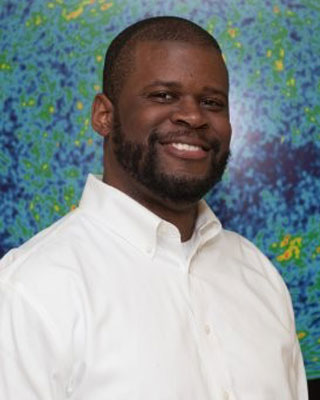Damon Bradley

Dr. Damon Bradley is simultaneously the founder and CEO of DeepSpace Technologies, a Space Technology and DSP Startup Company, a Principal DSP Engineer at Syncopated Engineering, A lecturer for Executive Leadership Council, and an adjunct professor at University of Maryland, Baltimore County.
Dr. Bradley started DeepSpace Technologies with a passion for and over 20 years of experience inventing digital signal processing systems for space exploration, astrophysics, and Earth science. He spent 2 decades at NASA Goddard Space Flight Center as a branch head, founder of the DSP technology group, and an innovator winning approximately $10 million in new funding for various R&D programs in the areas of radio spectrometry, smallsat instrumentation, and planetary exploration. In addition to scientific research, he managed over 30 projects valued over $100 million with a staff of 74 personnel while branch head in his last 3 years at NASA. Dr. Bradley holds a patent as an inventor of the software-defined-radiometer (patent #10768213) and has developed spectral radio signal processing systems for Earth, Lunar, and Saturn-exploration applications.
Dr. Damon Bradley is currently the Branch Chief of NASA Goddard Space Flight Center's Instrument Electronics Development Branch. In this capacity, Dr. Bradley oversees 74 civil-servant and contractor electrical and computer engineers, technicans, group leaders, and associate supervisors. He is solely responsible for the development of both spaceflight mission scientific instrumentation as well as leading research and development efforts from more than two dozen efforts at any given time. While providing technical oversight, Dr. Bradley also provides administrative direction, developing staffing and funding plans for various projects, cost estimates for new business, and mentorship and guidance for a large demographic of employees. He interfaces with division, directorate, and center management frequently to obtain resources for efficient branch operation, and maintains the technical vision for the branch.
Dr. Bradley founded the Digital Signal Processing Technology Group in 2008 within the Instrument Electronics Development Branch at NASA Goddard. The group has received the NASA Applied Engineering Technology Directorate Win New Work Award, having been awarded over 12 Internal Research and Development research grants. Dr. Bradley is also a member of the IEEE Signal Processing Society. Current research interests include statistical signal processing, information theory, Earth remote sensing, small satellite instrumentation, and compressive sensing.
Dr. Bradley is currently developing sub-mm RF spectrometer technology for organic molecular discovery on numerous solar system scientific targets, including the Moon and Enceladus (Saturn). In addition, he's currently the systems engineer developing a multi-channel Lunar plasma-wave spectrometer instrument that measures solar wind interaction with the Lunar surface and resulting solar plasma. He is also developing RFSoC-based signal processing algorithms for analyzing cryogenic detector signals for astrophysics observatories, and was the lead engineer to architect the signal processing system for a proposed $3-Billion dollar space telescope proposed in the National Research Council's Astrophysics Decadal Survey.
Dr. Bradley also serves as a committee member for PhD students at UMBC and Morgan State University. To date, he's served on over 13 PhD Dissertation Defenses and helped graduate as many students.
Development of a Multirate, MultiChannel WOLA Spectrometer for Lunar Plasma Wave Investigation
Status: Available NowComing soon!
Live Q&A with Damon Bradley - Development of a Multirate, MultiChannel WOLA Spectrometer for Lunar Plasma Wave Investigation
Status: Available NowLive Q&A with Damon Bradley for his talk titled "Development of a Multirate, MultiChannel WOLA Spectrometer for Lunar Plasma Wave Investigation"
Spectrometer Signal Processing Systems for NASA Space Applications (2020)
Status: Available NowFor many NASA Space Science Instruments flown aboard various spacecraft, digital spectrometers are a very common instrument class. These instruments are used for a vast array of scientific monitoring and observational applications, such as detecting organic compounds on distant planetary satellites in the solar system, measuring solar plasma interaction with the surface of our own Moon, monitoring geophysical parameters here on Earth, and determining the composition of exoplanet atmospheres several light years away. In particular, these instruments process signals arising from a vast swath of the radio spectrum, covering frequencies from near DC all the way up to sub-mm THz frequencies. Moreover, these systems must operate under extreme conditions of temperature and radiation environment, while also performing efficient computation under severe power constraints. This talk will cover practical implementation of digital spectrometers for these space applications, as well as some of the statistical signal processing methods used for detecting various phenomena in-orbit for particular Earth-observing instruments.
Live Q&A Discussion - Spectrometer Signal Processing Systems for NASA Space Applications (2020)
Status: Available NowLive Q&A Discussion with Damon Bradey following his talk 'Spectrometer Signal Processing Systems for NASA Space Applications'

